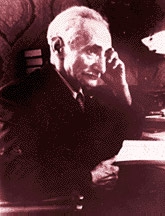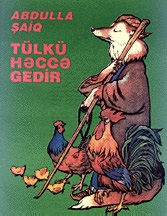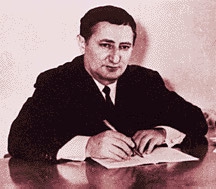|
|
 |
 |
No Guidelines Today
Now there is no Party
or State Resolution in regard to art and literature. The democratic
aesthetic has been developing for centuries-since ancient Greece-and
still exists today. We also rely on our own traditions in aesthetics,
literary and critical thought. Before the State used to interfere
even with our classical works. Publishing houses were required
to cut sections from works when they didn't conform to "Soviet
reality." The classical "divans", for example,
contained certain sections called "minajat" where the
poet addresses God at the conclusion of the work, and another
section called "qasida" where he praises the Prophet
Mohammad. These sections were eliminated from the works of Nizami,
Fuzuli and other classical poets, despite the fact that they
were penned centuries earlier.
When I published the "Memoirs" of my father, they took
out the chapter dealing with the Noruz holiday (Spring-March
21st). I petitioned the Department of Ideology of the Central
Committee of the Soviet Party only to be told that Azerbaijanis
had only one holiday-the Great October Revolution. I had no choice
but to publish the book without that section. That was 1960.
My father felt a lot of pressure as a writer and for no serious
reason. People used the word "angel" when they referred
to him. No writer celebrated his Jubilee as young as 40 [usually
Jubilees begin at 50 or 60]. But my father was so dearly loved
by his students that they carried him in their arms from his
home to the Jubilee Hall. Actually, I think his "angel"
character saved him from the Stalin Repression in 1937 because
he had been a member of the Musavat Party which was the leading
part of the Azerbaijan Republic in 1918-20 which opposed the
Soviets. Most party members either escaped abroad when the Soviets
came in 1920, or they were captured and exiled in Siberia. Also
my father had written about 10 articles in the spirit of pan-Turkism.
But it was when his brother, Akhund Talib Yusufzade, left for
Turkey that he began feeling pressured.
My father was a great educator and teacher. In some of his works
written for children, we see motifs that can be appreciated by
grown-ups as well. For example, in his work "The Fox Goes
on a Pilgrimage" ("Tulku Hajje Gedir") the cunning
fox becomes the symbol of the two-faced representatives of religion.
Did he really intend such works for children or for grown-ups?
I think both. Ten years ago they created an animated version
of this story but soon the film was forbidden. Why? Probably
because some leaders recognized themselves.
Trends Today
It's very difficult
to say what is happening in Azerbaijani literature today. It
takes considerable time to assess the literary process. It's
difficult to see these changes when we are in the middle of them.
Ten years from now, we'll look back and assess this period more
accurately.
Generally speaking, I'm not aware that there is as much literary
talent today as there was during the Soviet period. But there
are still fine works being produced by writers such as Sabir
Ahmadli, Isa Husseinov, Yusif Samadoglu and others.
Movlud Suleymanli's work, "The Mill" marks the beginning
of a surrealistic trend in Azerbaijani literature. In this work
you find an analytical approach along with metaphoric expression.
All the problems of the village become evident through the conversation
of the people sitting together at the old village mill.
Today is a very difficult period for writers, scholars and other
professionals in the arts; they don't yet feel stability and
certainty. Nor have they been able to find their places in the
market economy. For example, up until recently, I had always
worked in the Academy of Sciences. My salary was sufficient to
live quite well and even to travel on holidays every year. But
now I have to supplement my salary by teaching at one of the
private universities. At the age of 72, this is the only way
I can earn a living for my family.
The Writer's Union no longer takes care of its writers. It used
to be that they would assist in getting works published, help
writers get apartment and funds. The building used to be alive
with intellectual discussion. But most writers don't expect anything
from them any more. Writers who manage to publish anything today
do it through their own personal relationships.
The main problem of Azerbaijani literature is that it has always
focused on people and their relationships to society. During
the Soviet Period, writers had to conform to the Soviet system.
You had to describe his "happy" life in the Soviet
society. They wanted all the writers to develop what they called
"the realistic style."
But a writer like Samad Vurgun was romantic. He was born that
way, it was his nature. How could he have been a realistic poet?
Let me give you an example of how such writers managed to succeed
under such restrictions. My father had an epic poem, "Gochpolad,"
which described the national liberation movement in Azerbaijan
in the 18th century.
Back in 1937-38, he submitted the poem to one of the magazines
which promised to publish it, but only after a year. It was Vurgun
who advised my father to add a line using Stalin's name. My father
was shocked. How could he add the name of Stalin when the poem
was set in the 18th century? Eventually, he found a way to do
so and the poem was published immediately. You see what kind
of things were happening? Sometimes, I feel ashamed of the things
that we had to do in the past. But we did it to survive.
Samad Vurgun wrote 18 poems about Stalin. He saved himself and
he also was able to help his people to a certain degree. Had
he not done so, could he have spoken out against the Russian
alphabet in one of the Supreme Soviet meetings? Could he have
criticized the frequent alphabet changes in Azerbaijan? You have
to understand the context in which we lived and worked, then
you'll understand our pressures and predicaments and why our
new-found freedom is so valuable to us.
Talibzade is an Academician at Azerbaijan's Academy of
Sciences and one of the best-known literary critics in Azerbaijan.
For more than 50 years, he has been working at the Nizami Institute
of Literature and has authored approximately 30 books and 300
scholarly articles. His father was Abdulla Shaig, a famous children's
writer (1881-1959). Jala Garibova interviewed Talibzade for this
article.
From Azerbaijan
International (4.1)
Spring 1996.
© Azerbaijan International 1996. All rights reserved.
Back to Index
AI 4.1 (Spring 1996)
AI Home | Magazine
Choice
| Topics
| Store
| Contact
us

